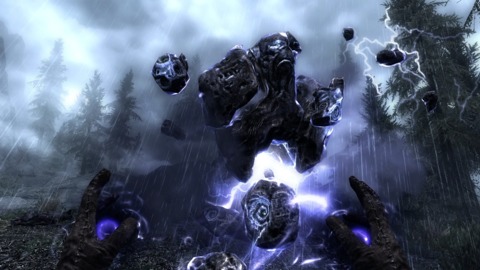
How is it that after 60 hours of The Elder Scrolls V: Skyrim, the first thing I want to do when I finish writing this review is play more Skyrim? It's simply because, like Bethesda's Elder Scrolls and Fallout games before it, Skyrim offers a fantasy world so rich and expansive that to describe other games in those terms after playing this one would just feel hollow. The sheer amount of content packed into the game is a true marvel of video game production; it's even more marvelous that all of it is so well executed that you want to see and do everything, and better still that you're free to play it all in whatever way you want. Unsurprisingly, Skyrim isn't perfect in a technical sense, but it gets close enough to fulfilling the potential of this specific role-playing format that the experience it offers is absolutely essential.
Bethesda has famously explored a different province of its fantasy world Tamriel in each Elder Scrolls game, and this fifth entry turns its attention northward to the frozen Nordic land of the game's title. Skyrim is literally Nordic in that it's the homeland of Tamriel's hearty, honor-bound people the Nords. But Skyrim's design is also heavily influenced by real Nordic artwork and traditions. It's pretty much all Vikings, all the time; everything is all longships and mead halls and the exaltation of battle as a conveyance to the glorious Nord hereafter of Sovngarde. There's a great coherence to Skyrim's cultural identity that makes it feel like a grounded and believable place, if a fantastic one. But it's also as diverse as any land in Tamriel, and you'll frequently bump into members of every one of The Elder Scrolls' factions, from snooty high elves to Argonian lizardmen. Skyrim's nine capital cities are especially memorable, to say nothing of the sprawling lands between them: one, a mining center, is hewn right out of a mountainside, while another rises defiantly on a hilltop in the middle of a vast plain. From end to end, this is a wonderful and endlessly intriguing land to explore.
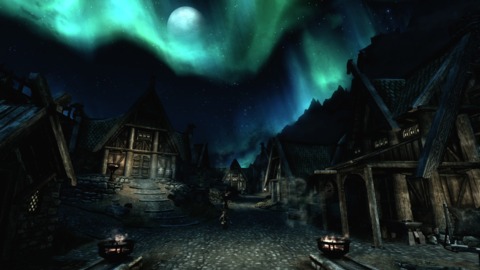
There's a lot going on here, but the crux of this game is dragons. After an absence so long that most of Skyrim's residents suspect they never really existed at all, the villainous wyrms have returned to scorch the countryside and terrorize its populace. As the first Dragonborn warrior to appear in an age, you're the only one around who can permanently kill a dragon, and thus the person responsible for discovering why they're back and what can be done to stop them. That quest forms the backbone of Skyrim's core storyline, and it's a story well worth seeing through to the end, with genuine twists, intrigue, and momentum that drive it forward in a way Bethesda's past games really haven't. For reference, I found Fallout 3's main storyline mostly forgettable and only finished it from a sense of obligation, and Oblivion's I hardly touched at all. I suspect Skyrim's story will prove more engaging for most players; I know it was for me. And in contrast to the disappointing finality of the last two Fallout games, the way Skyrim's main story "ends" is also wholly appropriate for a game as open and non-linear as this one. After the events of the final quest play out, you're simply left standing there, free to continue exploring or marauding or whatever it is you want to do. The only way to view the credits is from the title screen. That struck me as a really elegant way to handle things.
If you've played one of Bethesda's RPGs before, you know that main storyline is only a small part of what the game offers, and it's a part you're free to completely ignore in the interest of just roaming around, looking for other stuff to do. And there is so, so much other stuff. Even if there were no dragons, Skyrim would be a chaotic place with a lot of social and political turmoil going on. There's a civil war brewing, between the Imperials (from the previous game's province of Cyrodiil) who want to keep a tight rein on the indigenous populace, and a growing band of rebels led by Ulfric Stormcloak, the would-be king of the Nords. There's tension between different races squeezed into cramped living quarters. There's religious oppression, ethnic displacement, feuding families, betrayal, and plenty of murder. Even Tamriel's mischievous demigods of all bad things, the Daedra, continue to meddle with mortal affairs whenever the notion strikes them. Maybe it's unfair to compare this to games that have a small fraction of the time to work with, but Skyrim builds up a rich and interesting narrative backdrop like no other game in recent memory.
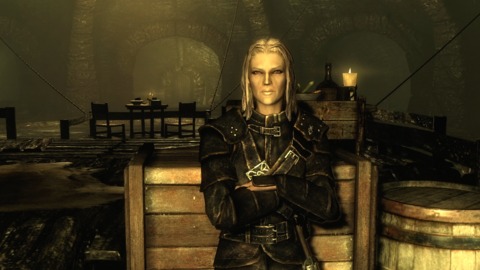
The point is, all these dynamics make for an enormous number of interesting quests. You're free to choose one side or the other in Skyrim's civil war, with a different sequence of quests associated with either side--though I love that it's tough to decide who to support, since neither side's hands are especially clean. Old favorite quest lines like the Thieves' Guild and Dark Brotherhood are well represented, and though the Fighters' and Mages' Guilds remain back in sunny Cyrodiil, there are respectively a ragtag group of mercenaries and a prestigious magic college in their place. Completing all the stories and quests for any one of those groups will occupy you for hours all by itself, to say nothing of the staggering number of one-off quests and minor objectives you can pick up wherever you go. Merely stepping into a new major city for the first time will expose you to more new quests and activities than you'll know what to do with. It's overwhelming in the best possible way, since each new distraction sounds interesting enough that you'll want to try to do everything. In a couple of cases, even a miscellaneous directive to check out something like a random excavation led me to an unexpected, hour-long underground ruin with its own self-contained storyline. You never know when adventure will present itself; you only know it will happen all the time, and it will pretty much always be worth undertaking when it does.
One of the reasons it's so appealing to follow every objective you find is that the quality of the game's dungeons is greatly improved over those in Oblivion, and feels like a further evolution of the sort of combat areas in Fallout 3. Gone are the lone cave and Elven ruin repeated ad nauseam across the landscape. Every dungeon and temple and tomb I explored felt distinctive in some way, which is not to say they don't share basic textures and other artwork. But they do have unique layouts, puzzles, and often storylines that are told through characters or journals or other elements you find there. (In general, the quest designers are especially good at making you feel like you've stumbled into a series of events that was already happening before you got there.) There are a lot of deep places to delve in Skyrim, from tunnels carved out of pure ice to decrepit dwarven ruins where magic-powered automatons still stalk the hallways. After burning out on all those identical dungeons in Oblivion, it was refreshing to actually enjoy exploring them again here.
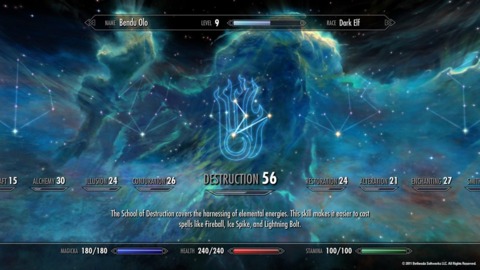
More refreshing than anything is the freedom to just do whatever the hell you want for as long as you want. Like its predecessors, the real magic of Skyrim lies in its matrix of interconnected systems that govern character behavior, object manipulation, the passage of time, and the ways your own abilities develop as you use them. That generalized framework for creating an enormous world and letting you explore it at your whim is as robust as it's ever been. You can talk to, pickpocket, or kill practically any character you see. Farmers and townspeople go about their daily business with little regard for your presence, unless you interfere with them. You can pick up and carry practically every item, from the finest mace to the dirtiest junk. And you've still got complete, unadulterated freedom to improve your skills in a wide variety of categories like one- and two-handed melee combat, archery, sneaking, shield blocking, multiple schools of magic, alchemy, and armor. The list goes on. Skyrim lets you dabble in all of these disciplines or focus on just a few, so you can organically create a full-on rogue who stabs people in the back, or an exceptionally powerful mage, or a guy who demolishes everything with a simple sword and shield. About halfway through, I transitioned from a combo of melee and destruction magic to one-handed melee and a shield since that fit my style better. You're never really locked into any of these choices, with the exception of the perks you pick, so you can change it up at any time.
About those perks, the way you build your character has been dramatically streamlined, so you're no longer dumping an allotment of points into a dozen categories and waiting for the effects to trickle down to your real-world performance. Now, when you level up you simply choose whether you want to increase your health, magic, or stamina, then you're granted one perk from any of those skill categories, though each perk comes with a minimum skill requirement before you can unlock it. It was initially tempting to look at this system as removing control from the player, but the way the perks are laid out still lets you create exactly the sort of character you want to play, just with a more descriptive upgrade path and more immediate, tangible benefits. If you want to play a mage, you're going to use more magic, increase your magicka more often, and unlock perks on the magic trees. Simple as that. The game does a good job of making your character options more accessible without dumbing down or removing those options outright.
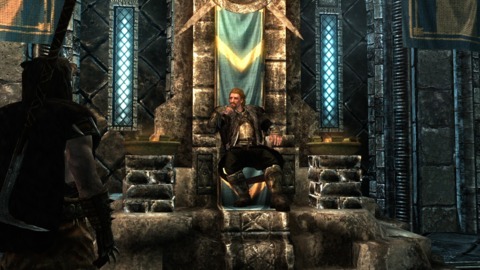
Combat is still not The Elder Scrolls' strongest aspect, but the feel of it has also improved significantly. Attacking with a melee weapon and blocking with a shield is a bit more tactile, though there are cases where enemies won't visibly react to an attack because they're in the middle of an attack animation of their own. In general, it's a bit easier to tell how close you need to be to connect with an enemy, but there's still some sense of flailing around blindly with your weapon. The addition of a new set of extra-powerful magic spells called shouts (derived from the ancient language of dragons) gives you some nice additional options for dealing with combat scenarios, too. There's no equivalent of the VATS system from Fallout, but the third-person kill camera has made its way over from that game, giving you some awfully dramatic attack animations from time to time when you drop an enemy. Some of these look better than others, but when the camera angle and animations really line up, they're worthy of exclamation. Nothing shows how far this game has come since Oblivion better than the dragon fights, though. The first time one of those awful beasts swoops down overhead and plucks a soldier from the ground, flings him a hundred feet into the air, then circles back around to strafe you with its flame breath is a legitimately jaw-dropping moment.
The interface, which is elegantly streamlined and clearly designed around the needs of a controller, is fantastic. Everything (with the exception of the perks screen and map) appears tastefully overlaid on top of the game world, and you can get to your inventory, perks, and map with a quick four-way pop-up menu that will get you to what you're looking for in a matter of seconds. Within your long list of stuff, you can add any item or magic spell as a "favorite" that you can then access from a quick list in combat, which makes it a lot easier to switch between multiple magic spells, weapons, and a shield if you want to play a hybrid class. The PC version... uses the exact same interface, but it actually works quite well with a mouse and keyboard. That's mainly because that four-way menu and the list of items and spells are all easily navigable with WASD, and even when you want to equip a highlighted item, you only need to click the mouse button you want to map it to, regardless of where the cursor is. The PC version seems like the clear winner here, since even if you don't like the default interface, you can be sure mods will come along to change not only that aspect of the game but every other one as well, in ways you and I haven't even thought of yet. The PC version also naturally looks by far the best and was able to tax even our fairly powerful office machine in the outdoor areas.
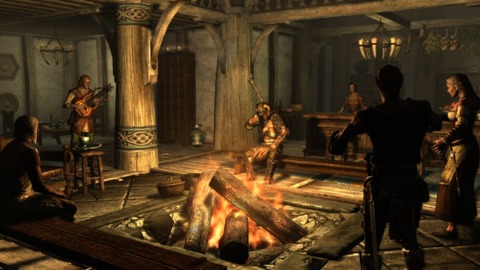
On both PC and 360, Skyrim looks utterly fantastic in its broad strokes. The sheer variety and grandeur of the landscapes and interiors in the game is breathtaking when you stand back and behold them. There are some spots on the periphery that look less than fantastic up close, though, such as rocks clearly built out of very few polygons. Some of the textures are noticeably low-resolution on the console as well. I mention this mostly to allay any concerns that the game somehow looks bad, though; if you're stopping to examine single rocks or stare at wall textures filling your screen, you're missing the point of this game. While we're nitpicking, the voice acting is generally quite good, though I guess I would be remiss not to mention that yes, a handful of voice actors are repeated a little too often. And though Max Von Sydow does a fantastic job with his work as a wizened old dragonslayer, an obviously different voice actor recorded a few additional lines for that character. When you get the same character alternating Von Sydow and other guy in quick succession, it really sticks out. At least the game now has a more natural way of engaging your perspective with the people you're talking to. Instead of comically zooming the camera in on their faces, the game just lets them stand there and chat with you. Imagine that!
Like me, you may have hoped Skyrim would be the game that finally allowed Bethesda to shed its reputation for making games that nearly collapse under their own complexity. It isn't. But things have gotten better. On the raw technical side, I experienced four lockups and one minor cave where the frame rate inexplicably became unplayable, and some dragon skeletons in particular tended to spawn halfway into the ground from time to time. A patch for the Xbox version of the game was released halfway through my reviewing process, so it's impossible to say how many of those issues (if any) would be mitigated by starting a new game with that patch applied. Within the boundaries of the game logic, NPCs occasionally act a little strangely in the way they move around the environment, in a manner that ought to be familiar to veterans of Bethesda's RPGs. Sometimes minor characters will wander between you and the character you're talking to, or walk up and loudly proclaim that they're training to be a blacksmith while a central story character is trying to get all expository. It's mostly harmless stuff, though it doesn't hurt to save often, since you can save anywhere. (It's nice that the game keeps your last three autosaves, so you'll never get stuck in a situation where you can't roll back if you end up in a fix.)
You'll probably have your own set of stories about the crazy things that happened during your many hours in Skyrim, including a horse fighting a dragon, and a conjurer who raised a slain chicken as her undead minion during a battle. Those both happened to me, by the way. Aside from the infrequent hard lockups and such, the oddities that tend to pop up in Bethesda's games have almost become part of the charm for me, though you know yourself how much those things detract from your own experience. But it hardly matters. No other game I know of operates with this many moving parts to create such an immense world filled with this much choice in how you engage its excellent, endless fiction. It's one thing when a game offers dozens of hours of gameplay; it's quite another when that gameplay is good enough you'll want to live in its world for that long.